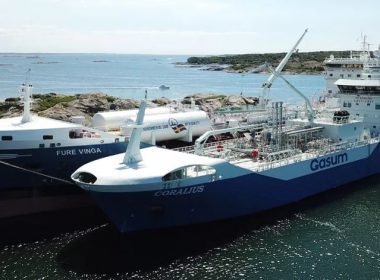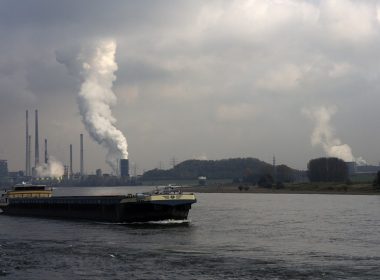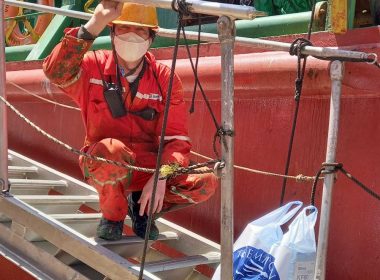COLUMN | What life was like before MARPOL [Grey Power]

Fifty years have passed since the Convention for the Prevention of Pollution from Ships, thankfully abbreviated to MARPOL, emerged from the IMO after a hard slog in London throughout the month of October 1973. We are asked to celebrate this half-century, which, with all its subsequent appendices and protocols, has become one of the pillars of the international maritime legal regime, and it is something to which all ought cheerfully to concur.
It was without a doubt a very important advance in the evolution of modern ship operation, which has had a huge effect upon the impact that ships have upon the environment. It emerged from the outrage that was generated by the first “supership” casualty after the grounding of the Suezmax oil tanker Torrey Canyon off the Cornish coast in 1967, with the loss of her entire cargo of 119,000 tonnes of crude. Two years later, the IMO Assembly, clearly swayed by public and political opinion, was persuaded to organise a major international conference to adopt an up-to-date convention that reflected the changing realities of modern shipping with all its scaled-up problems.
Spectacular casualties, of which the Cornish disaster was just one, might have appeared to be the main motivation that led to MARPOL, but equally responsible was the increasing nuisance and obvious environmental harm that was being done by operational pollution, from tank washing and bilge pumping, that was being routinely carried out. Nobody walking on any beach in any part of the world from the 1950s onwards would have been unaware of the black stains of oil that adhered to pebbles, feet, and footwear, sifted into the sand, and coated rocks. Oil-clogged birds would be regularly encountered. A day at the seaside would commonly be followed by a major tar-removing exercise, which probably meant throwing away all the towels and mats, all liberally coated.
“OILPOL was well-meaning, but seemed to make very little difference.”
It was, of course, just one function of the huge increase in the sea-borne carriage of oil, as industrial societies moved away from coal during post-war years. It was not as if the problems were not recognised. The year 1954 saw the International Convention for the Prevention of Pollution of the Sea by Oil (OILPOL) being signed in London to specifically address operational pollution, with various hopeful preventative measures to prescribe limitations on the amount of oil that could be admitted to the marine environment, and where these emissions should not take place.
OILPOL was well-meaning, but seemed to make very little difference to the state of those towels as the children returned from the beach, or to the numbers of dead birds washing around the rocks. Even subsequent amendments in the 1960s seemed to make only marginal improvements, largely attributed to the growth in the tanker fleet in both numbers and ship size.
It was not as if the tanker sector was wholly oblivious to the harm that it was doing and its best practitioners tried hard to mitigate the quantities of oily water they were pumping over the side. But they were required, on their ballast voyages, to clean their tanks to prevent the build-up of “clingage” – the residues adhering to the ship’s structure – so that they could arrive at their loading ports with reasonably clean tanks. Ideally, after washing with sea water, the tank residues would be discharged to reception facilities, but the provision of these was exceedingly limited. They used load-on-top techniques, the use of capacious slop tanks, and devised crude oil washing to restrict the introduction of water, but any system that demanded the separation of oil and water through settling out over time was both time-consuming and only partially successful.
“MARPOL took time, but it worked.”
Segregated ballast and the use of clean ballast tanks drastically restricted the amount of revenue-earning cargo that could be carried. Also, the provision of port facilities for oil reception remained poor. And let us admit there were a number of operators who just felt unconstrained by regulations or recommendations to recognise the needs of society. I recall hearing of an old-fashioned British coaster owner who insisted that the sea-birds clustered around his ships when the engine room bilges were being pumped in the estuary to eat this noisome product. Such an attitude was not unique.
This was before the days of howling mobs of environmental protesters and people gluing themselves to petrol tankers. More effective by far was a low-key scientific approach that tried hard to change operators’ opinions and persuade them that there were sensible solutions available to reduce the amount of oil that entered the sea, either by accident or operation. Committees considering oil pollution measures in London were sometimes attended by a formidable lady ornithological specialist from the Natural History Museum, who would emphasise her objections to pollution by producing from her handbag the oil-soaked corpses of sea birds, as her fellow committee members shrank back in horror. It was in such a fashion that the cultural changes that led to MARPOL were prefaced.
From all accounts, it was a long, hard haul to produce that 1973 breakthrough. There were flag states with large tanker fleets to be convinced. There was the obvious problem of trying to develop specification for equipment to measure oil content, or separators, before manufacturers had actually invented them. There were difficult charterers and recalcitrant port authorities and terminals and a lot of doubtful tanker operators whose crews would be foot soldiers on the front line of change. But that was all in the future. MARPOL had been produced and, as November 1973 began, it became a blueprint for the cleaner seas every sensible person wanted. It took time, but it worked.
Happy Birthday.







